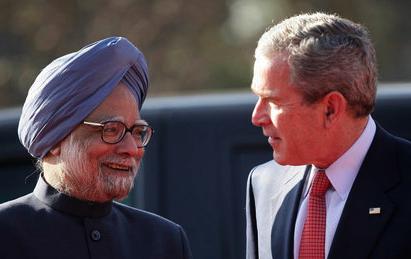With a whimper went President Bush's last, best chance for a positive legacy in international affairs. Last week administration officials conceded to the Financial Times that India would not approve a nuclear cooperation pact with Washington during Bush's tenure. In March 2006, President Bush signed a nuclear agreement in New Delhi designed to pull the world's largest democracy closer to the world's last superpower and dramatically alter Asia's balance of power. With Asia's economic rise, it is widely assumed that the continent's political emergence will follow in the coming decades. By agreeing to cooperate with India on nuclear issues -- in a deal so cushy it would undermine existing international nonproliferation agreements -- the Bush administration sought to ensure New Delhi's interests would align with Washington's as geopolitical power shifts east. "Where Nixon had used China to balance the Soviet Union, Bush was using India to balance China,"
Death of U.S.-India Nuclear Deal Another Blow to Bush Legacy

